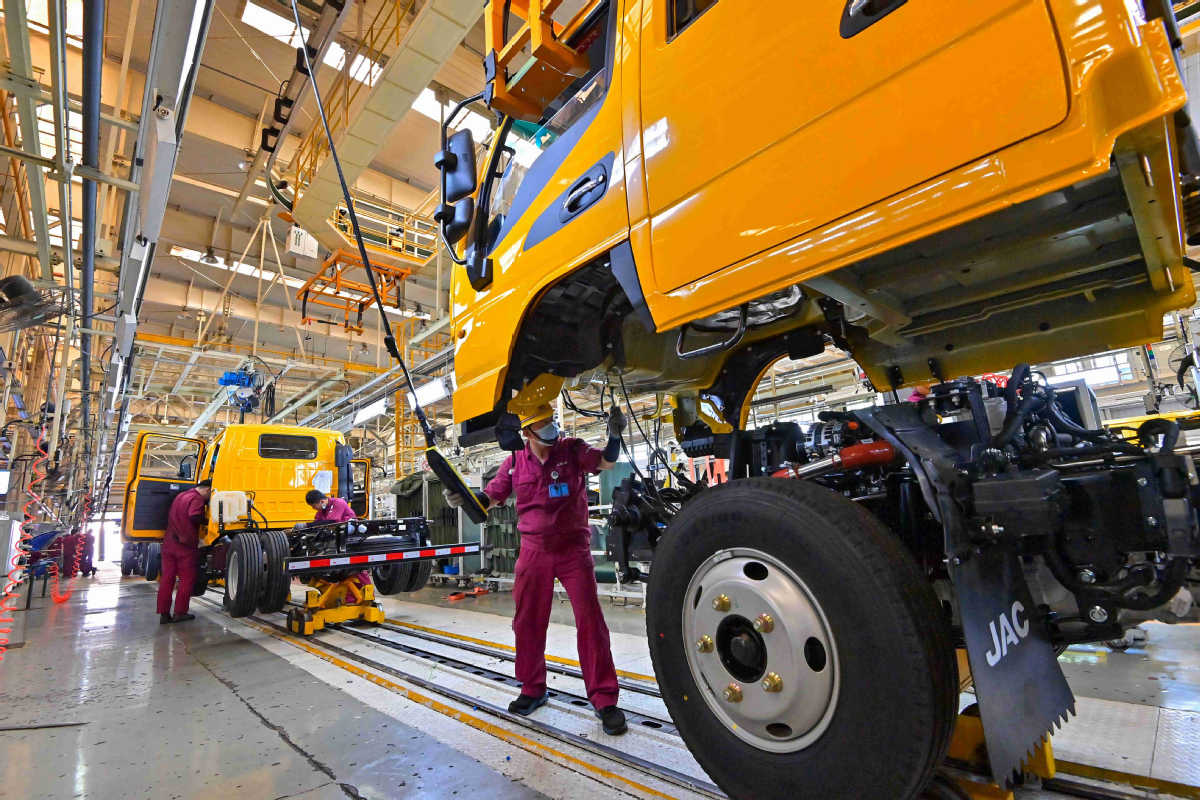Dynamic clearance puts growth of firmer footing


Improved capacity
Caroline Wu, managing director of Maersk China, part of Danish shipping and logistics giant A.P.Moller-Maersk, said demand for transportation services will surge in the Yangtze River Delta region in coming weeks.
Ocean East Logistics Co, a wholly owned subsidiary of Maersk China in Shanghai, has maintained a closed-loop management system since mid-April, helping customers with warehousing, consolidation and distribution services.
The capacity of Maersk trucking services to and from Shanghai has gradually improved to 70 percent.
Wu said, "We will work closely with our customers and partners to seek alternative solutions, including multimodal services between Shanghai and nearby cities."
Zhou Mi, a senior researcher at the Chinese Academy of International Trade and Economic Cooperation in Beijing, said the dynamic zero-COVID strategy is a responsible decision aimed at reducing the possibility of new deadlier and more transmissible variants of COVID-19 emerging as the coronavirus constantly mutates.
In addition, the strategy offers enterprises clear paths to abide by related policy measures, and such policy transparency and predictability are extremely important for businesses to continue growth, Zhou said.
A surge in orders at Yangzijiang Shipbuilding Group, which is based in Jingjiang, Jiangsu province, is testimony to such growth.
Orders received by the company recently reached the highest level for nearly two decades, with about 90 percent of them placed by foreign clients, mainly from Japan, Singapore and a number of European countries.
He Minghui, the group's assistant president, attributes the rise in overseas orders mainly to surging demand at foreign shipping and energy companies, as well as his company's ability to meet such demand, which is guaranteed by China effectively controlling the epidemic.
"If China abandons the dynamic zero-COVID policy, the predictable high number of infections in the nation's manufacturing sector will disrupt global trade and supply chains, not only affecting economic recovery in many countries, but also resulting in businesses and customers facing shortages of industrial and consumer goods," he said.
Optima Integration Group, or OIG, a leading frozen products import service platform in China, has seen steady growth in the first four months of this year despite recent disruptions to cold-chain logistics.
If services at a specific port are unavailable due to a resurgence of COVID-19 cases, the use of information technology and digital tools enables the company to offer flexible services to domestic and foreign clients at other such locations.
Gao Zichun, OIG's operations director, said the introduction of detailed measures by customs authorities nationwide to smooth the operations of industrial and supply chains and assist businesses during the nation's broader efforts to safeguard foreign trade growth have helped the company operate more efficiently.
"China needs to adhere to the dynamic zero-COVID policy, despite the epidemic-related shutdowns of factories and disruptions to logistics creating obstacles for many businesses to maintain highly efficient operations temporarily," Gao said.
"If the nation relaxes COVID-19 measures, a large number of deaths will likely occur, in view of limited and unbalanced medical resources among regions and China's large population," Gao said, adding that this will have a severe impact on overall economic growth and will eventually harm all businesses.
According to a study by the OIG Institute, the company's research facility, if the epidemic spreads nationwide, the food supply industry and many others will be badly affected, Gao said.
Zhang Jianping, head of the Center for Regional Economic Cooperation at the Chinese Academy of International Trade and Economic Cooperation, said the nation's effective control of the epidemic to restore normal economic operations is invaluable in stabilizing global industrial and supply chains and shoring up economic recovery worldwide.
Chen Bin, executive vice-president of the China Machinery Industry Federation, which is based in Beijing, said, "Faced with various challenges, such as rising commodity prices and fierce competition in low-end manufacturing from Southeastern Asian economies, it is equally important for China to adopt new solutions to ensure the stability of its industrial chains while implementing the dynamic zero-COVID policy."
Adhering to the policy is evidence of China's wisdom in sustaining long-term growth, Chen said.
The nation has strengthened epidemic prevention and control measures significantly since 2020, Chen added.
























